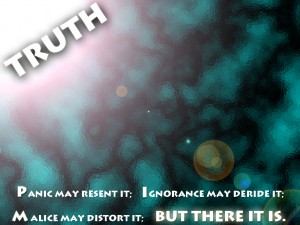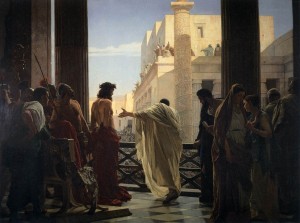 What is truth? This is the famous question that Pontius Pilate, the fifth Prefect of the Roman province of Judea, asked Jesus before his crucifixion. The fact that Jesus didn’t answer him used to bother me. Here was a great opportunity for Jesus to speak profound wisdom to a man who seemed, at times, to genuinely want it. Why didn’t Jesus tell him?
What is truth? This is the famous question that Pontius Pilate, the fifth Prefect of the Roman province of Judea, asked Jesus before his crucifixion. The fact that Jesus didn’t answer him used to bother me. Here was a great opportunity for Jesus to speak profound wisdom to a man who seemed, at times, to genuinely want it. Why didn’t Jesus tell him?
The desire for Jesus to unfold wisdom on the truth was ultimately mine, like all of us who are seeking something higher than ourselves. We want the truth to be explained to us in a simple to understand language so we can just know it already. And so I marveled over the fact that the Gospel of John gives no record of Jesus answering Pilate over this important question.
I don’t sweat the fact that Jesus didn’t answer him anymore, perhaps because I now know that truth cannot be explained in words. Rather, it can be found in silence.
Let’s look at the dialogue between Pilate and Jesus in more detail to unveil a little more of the mystery surrounding the concept of truth.
John 18: 37-38 states:
“Pilate therefore said unto him, Art thou a king then? Jesus answered, Thou sayest that I am a king. To this end I was born, and for this cause came I into the world, that I should bear witness unto the truth. Every one that is of the truth heareth my voice.
Pilate said unto him, What is truth? And when he had said this, he went out again unto the Jews, and saith unto them, I find in him no fault at all.”
 Let’s back up to Pilate’s question for a moment. Remember that I stated that Pilate seemed, at times, to want truth? Pilate was a real historical figure. But in the scripture he represents the wavering mind, always fluctuating between that which is right and wrong, higher and lower action. Our evidence is that he admits finding no fault in Jesus, but yet he sacrifices him anyway. He even washes his hands in water to make a public declaration; he wants to be free of the guilt of the great sin he is about to commit, but his actions speak otherwise. He goes through with the sacrifice even though he knows it’s not right.
Let’s back up to Pilate’s question for a moment. Remember that I stated that Pilate seemed, at times, to want truth? Pilate was a real historical figure. But in the scripture he represents the wavering mind, always fluctuating between that which is right and wrong, higher and lower action. Our evidence is that he admits finding no fault in Jesus, but yet he sacrifices him anyway. He even washes his hands in water to make a public declaration; he wants to be free of the guilt of the great sin he is about to commit, but his actions speak otherwise. He goes through with the sacrifice even though he knows it’s not right.
Even Pilate’s wife warns him to not kill Jesus because of a dream (Matt 27:19). If Pilate represents the wavering mind, then his wife represents Pilate’s emotion-nature, which also tells him not to do it!
Many theologians believe Pilate sacrificed Jesus because he was afraid of the Jews. But the esoteric meaning goes much deeper. The story is trying to show us what truth is without words. The truth can be found more in Jesus’ silence than in anything we could explain.
To better understand the truth, we are going to have to delve into the deeper nature of the Christ, something of which Jesus could never explain to Pontius Pilate, the wavering mental-emotional activity of human ego. If Jesus had tried to explain the truth to Pilate, Pilate would have walked away with a doctrine and a set of beliefs. I think this is best left to the world of religion, don’t you?
The truth about truth is that it needs no explanation. The truth cannot be put into words. The truth about truth is that it can only be experienced in silence.
So what is the experience?
There is a scripture in the Old Testament which states,
“Be still and know that I am God” (Psalm 46:10).
I love this scripture because it speaks to the experience of truth that lies beneath the chattering of our mental activity. Sometimes we just have to be still. If you try it you will find that there is a beauty in that stillness, a God-like beauty.
Esoteric literature teaches us that the Christ is in everything.
Hence the scripture,
“The same was in the beginning with God. All things were made by him; and without him was not anything made that was made.” (John 1:3).
If Christ is already within you, and you want to experience Christ, stop. Get still. Be still. And abide in that stillness, that silence.
I leave you with a YouTube video featuring Eckart Tolle and the experience of stillness, silence. I hope you watch it! It speaks of the ever abiding Christ nature within us!
Yes,It Is In each and every one of us the truth and exclusive to anyone other than ourself as our truth is not anothers truth nor ever could be as we are individuals even though we are all as one and all that is. Amen x
I have found the whole Passion story to be a very helpful metaphor for dealing with catastrophic (sudden, acute, radical) change in my life, such as divorce or the diagnosis of cancer.
It usually all begins with the trumphal optimism of Palm Sunday. All is well in my life, the Messiah has arrived and my life is about to be crowned with glory.
Then without warning, everything descends into chaos. Secure beliefs that I thought I could trust are suddenly cast into doubt. Things are not as I assumed them to be. What a cosmic joke to be asked to define truth in the midst of such psychological chaos. Lies, betrayal, insanity and every other human foible come at me from every direction.
Finally, I come to rest in the silence and darkness of the tomb. All is lost. All hope abandoned.
Then very slowly, the door of the tomb opens, ever so slightly, revealing the smallest glimmer of hope. Perhaps all is not lost.
Deep within my imagination, at the root of all consciousness lies the God of Second Chances; the hope of a resurrection.
By fanning that glimmer of hope, I can perhaps begin again. I can construct a new set of beliefs with which to enhance the consciousness of life.
My recovery has begun.
Hello Joshua,
Truth is ’emet’ in Hebrew, written as 1-40-400.
You can read it as: 1-met. One is ‘echad’, numerical value thirteen. The word ‘ahava’, Love, has the same numerical value which means that one, oneness, unity, the One equals love, unconditional Love.
When you take away this 1 you are left with ‘met’.
‘Met’ means dead.
When your truth lacks this unifying factor, this unconditional Love of the number one, then you are left with death. Then you will be at the mercy of ego and emotions (40) and the suffering of enslavement/addiction (400) which is the suffering of the cross.
It means that truth is not something that can be captured in words and ideas. It needs to be lived and experienced. It needs to come to you wordless in silence.
Anny
Good morning Anny & Josh,
catching up on many posts this last eve and this morning…
thank you Anny for your very insightful posts, which profoundly compliment Josh’s awesome blog and you are filling in some gaps for myself as I have just begun to study the Autiot
and have already begun to understand the correlations, a lovely universal song!
Am also having some thoughts on the biblical paragraphs and verses and their familiar similarities to the Aut…
Josh,
your research of the feminine role in consciousness is very succinct, my personal view is that there has always been a 13th (refer to Anny’s post concerning the Hebrew meaning of the number 13) apostle/teacher, Mary Magdalene, although hidden though the ages, my understanding is she aided Jesus with the flow/opening of the frontal lobes. Our angelic nature!
Thank you again and a Blessed Thanksgiving to all!
“We cannot give thanks without giving”
Sparks,
You’re very welcome. I do plan on digging into Mary Magdalene one day on this blog. Lot’s of good information to cover there. Will hopefully get to it in the not so distant future. Blessings!
Great acrticle and follow-up Josh and Anny,
Anny what is your background? And do you also have a Blog?
Hi Mike,
Thanks for your question.
My background is grammar school with 6 years of 4 modern and 3 ancient languages, next to all other subjects you study during high school, 11 years in Israel with studies of Judaism and of course modern Hebrew, reading a lot of books about spirituality and religion and a search for the essence of all that, much travelling and visiting countries with other cultures, acquiring two Buddhist daughters in law in the process. During the last twenty years also awakening interest in mysticism and esoteric interpretation of religions. Purely autodidact (is that English too?) or self taught.
No, I do not have a blog and posting comments and articles on Joshua’s blog is pretty much a first for me. And I do not know if you have noticed it, I am learning along the way too! It is a very interesting process. When I am starting to write an article and look at the Hebrew texts, I do not know what will be the result yet, apart from some (to me) basic knowledge which I use as building blocks to start with but which somehow turn into an amazing insight. There is intuitive insight as well. I just know when to listen to that.
I hope this answers your question.
Anny